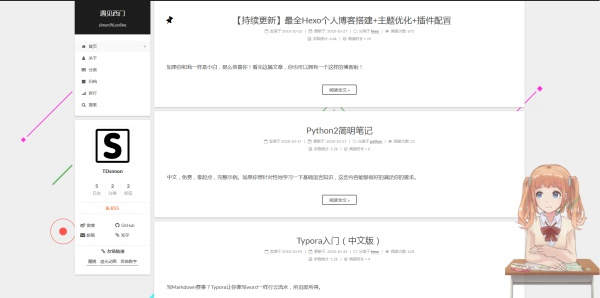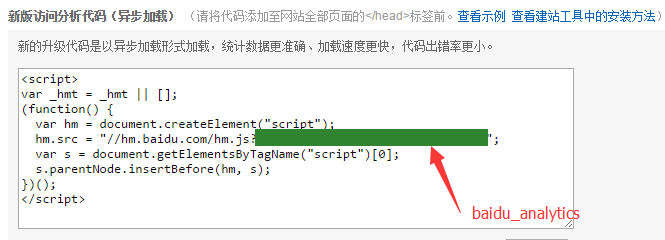如果你和我一样是小白,那么恭喜你!
看完这篇文章,你也可以拥有一个这样的博客啦!

前言
- 欢迎在文末留言,或者点击加入QQ群933583982互相交流。
- 本文采用 CC BY-NC-SA 4.0 许可协议,转载请注明出处!
- 【持续更新】链接:www.simon96.online/2018/10/12/…
博客搭建
准备环境
-
Node.js 下载,并安装。详细步骤:www.simon96.online/2018/11/10/…
-
Git 下载,并安装。详细步骤:www.simon96.online/2018/11/10/…
-
安装Hexo,在命令行(即Git Bash)运行以下命令:
npm install -g hexo-cli
-
初始化Hexo,在命令行(即Git Bash)依次运行以下命令即可:
以下,即存放Hexo初始化文件的路径, 即站点目录。
$ hexo init <folder> $ cd <folder> $ npm install新建完成后,在路径下,会产生这些文件和文件夹:
. ├── _config.yml ├── package.json ├── scaffolds ├── source | ├── _drafts | └── _posts └── themes注:
-
hexo相关命令均在站点目录下,用Git Bash运行。
-
站点配置文件:站点目录下的
_config.yml。 路径为
<folder>\_config.yml -
主题配置文件:站点目录下的
themes文件夹下的,主题文件夹下的_config.yml。 路径为
<folder>\themes\<主题文件夹>\_config.yml
-
-
启动服务器。在路径下,命令行(即Git Bash)输入以下命令,运行即可:
hexo server
-
浏览器访问网址:
http://localhost:4000/
至此,您的Hexo博客已经搭建在本地。
实施方案
方案一:GithubPages
-
创建Github账号
-
创建仓库, 仓库名为:<Github账号名称>.github.io
-
将本地Hexo博客推送到GithubPages
3.1. 安装
hexo-deployer-git插件。在命令行(即Git Bash)运行以下命令即可:$ npm install hexo-deployer-git --save3.2. 添加SSH key。
-
创建一个 SSH key 。在命令行(即Git Bash)输入以下命令, 回车三下即可:
$ ssh-keygen -t rsa -C "邮箱地址" -
添加到 github。 复制密钥文件内容(路径形如
C:\Users\Administrator\.ssh\id_rsa.pub),粘贴到New SSH Key即可。 -
测试是否添加成功。在命令行(即Git Bash)依次输入以下命令,返回“You've successfully authenticated”即成功:
$ ssh -T git@github.com $ yes
3.3. 修改
_config.yml(在站点目录下)。文件末尾修改为:# Deployment ## Docs: https://hexo.io/docs/deployment.html deploy: type: git repo: git@github.com:<Github账号名称>/<Github账号名称>.github.io.git branch: master注意:上面仓库地址写ssh地址,不写http地址。
3.4. 推送到GithubPages。在命令行(即Git Bash)依次输入以下命令, 返回
INFO Deploy done: git即成功推送:$ hexo g $ hexo d -
-
等待1分钟左右,浏览器访问网址:
https://<Github账号名称>.github.io
至此,您的Hexo博客已经搭建在GithubPages, 域名为https://<Github账号名称>.github.io。
方案二:GithubPages + 域名
在方案一的基础上,添加自定义域名(您购买的域名)。
-
域名解析。
类型选择为 CNAME;
主机记录即域名前缀,填写为www;
记录值填写为自定义域名;
解析线路,TTL 默认即可。
-
仓库设置。
2.1. 打开博客仓库设置:
https://github.com/<Github账号名称>/<Github账号名称>.github.io/settings2.2. 在Custom domain下,填写自定义域名,点击
save。2.3. 在站点目录的
source文件夹下,创建并打开CNAME.txt,写入你的域名(如www.simon96.online),保存,并重命名为CNAME。 -
等待10分钟左右。
浏览器访问自定义域名。
至此,您的Hexo博客已经解析到自定义域名,
https://<Github账号名称>.github.io依然可用。
方案三:GithubPages + CodingPages + 域名
GithubPages 在国内较慢,百度不收录,而CodingPages 在国外较快。所以在方案二的基础上,添加CodingPages 。
-
创建Coding账号
-
创建仓库, 仓库名为:<Coding账号名称>
-
进入项目里『代码』页面,点击『一键开启静态 Pages』,稍等片刻CodingPages即可部署成功。
-
将本地Hexo博客推送到CodingPages
4.1. 鉴于创建GithubPages 时,已经生成过公钥。可直接复制密钥文件内容(路径形如
C:\Users\Administrator\.ssh\id_rsa.pub), 粘贴到新增公钥。4.2. 测试是否添加成功。在命令行(即Git Bash)依次输入以下命令,返回“You've successfully authenticated”即成功:
$ ssh -T git@git.coding.net $ yes4.3. 修改
_config.yml(在存放Hexo初始化文件的路径下)。文件末尾修改为:# Deployment ## Docs: https://hexo.io/docs/deployment.html deploy: - type: git repo: git@github.com:<Github账号名称>/<Github账号名称>.github.io.git branch: master - type: git repo: git@git.dev.tencent.com:<Coding账号名称>/<Coding账号名称>.git branch: master4.4. 推送到GithubPages。在命令行(即Git Bash)依次输入以下命令, 返回
INFO Deploy done: git即成功推送:$ hexo g $ hexo d -
域名解析
-
添加 CNAME 记录指向 <Coding账号名称>.coding.me
类型选择为 CNAME;
主机记录即域名前缀,填写为www;
记录值填写为自定义域名;
解析线路,TTL 默认即可。
-
添加 两条A 记录指向 192.30.252.153和192.30.252.154
类型选择为 A;
主机记录即域名前缀,填写为@;
记录值填写为192.30.252.153和192.30.252.154;
解析线路,境外或谷歌。
-
在『Pages 服务』设置页(
https://dev.tencent.com/u/<Coding账号名称>/p/<Coding账号名称>/git/pages/settings)中绑定自定义域名。
-
至此,您的Hexo博客已经解析到自定义域名,https://<Github账号名称>.github.io和https://<Coding账号名称>.coding.me依然可用。
方案四:云服务器 + 域名
该方案需要先购买云服务器和域名。
-
在云服务器安装Git 和 Nginx。(Git 用于版本管理和部署,Nginx 用于静态博客托管。)
登陆root用户,运行:
$ yum -y update $ yum install -y git nginx -
Nginx配置
2.1. 创建文件目录(用于博客站点文件存放)
cd /usr/local/ mkdir hexo chmod 775 -R /usr/local/hexo/2.2. 添加 index.html(用于检测配置 Nginx 是否成功)
vim /usr/local/hexo/index.html添加以下代码,并保存。
<!DOCTYPE html> <html> <head> <title></title> <meta charset="UTF-8"> </head> <body> <p>Nginx running</p> </body> </html>2.3. 配置 Nginx 服务器
vim /etc/nginx/nginx.conf修改server_name和root:
server { listen 80 default_server; listen [::]:80 default_server; server_name www.baidu.com; # 填个人域名 root /usr/local/hexo/; }2.4. 启动nginx服务;
service nginx start2.5. 云服务器浏览器访问个人域名或IP,若跳转index.html,则配置完成,否则检查以上配置。
-
git配置
3.1. 创建文件目录, 用于私人 Git 仓库搭建, 并更改目录读写权限。
cd /usr/local/ mkdir hexoRepo chmod 775 -R /usr/local/hexoRepo/3.2. Git 初始化裸库。
cd hexoRepo/ git init --bare hexo.git3.3. 创建 Git 钩子(hook)。
vim /usr/local/hexoRepo/hexo.git/hooks/post-receive3.4. 输入以下信息,用于指定 Git 的源代码 和 Git 配置文件。
#!/bin/bash git --work-tree=/usr/local/hexo --git-dir=/usr/local/hexoRepo/hexo.git checkout -f3.5. 保存并退出后, 给该文件添加可执行权限。
chmod +x /usr/local/hexoRepo/hexo.git/hooks/post-receive -
本地博客推送到云服务器
4.1. 安装
hexo-deployer-git插件。在命令行(即Git Bash)运行以下命令即可:$ npm install hexo-deployer-git --save4.2. 添加SSH key。
-
创建一个 SSH key 。在命令行(即Git Bash)输入以下命令, 回车三下即可:
$ ssh-keygen -t rsa -C "邮箱地址" -
添加到 github。 复制密钥文件内容(路径形如
C:\Users\Administrator\.ssh\id_rsa.pub),粘贴到New SSH Key即可。 -
测试是否添加成功。在命令行(即Git Bash)依次输入以下命令,返回“You've successfully authenticated”即成功:
$ ssh -T git@github.com $ yes
4.3. 修改
_config.yml(在站点目录下)。文件末尾修改为:# Deployment ## Docs: https://hexo.io/docs/deployment.html deploy: type: git repo: root@xxx.xxx.xxx.xxx:/usr/local/hexoRepo/hexo //用户名@域名或 IP 地址:/usr/local/hexoRepo/hexo branch: master注意:上面仓库地址写ssh地址,不写http地址。
4.4. 推送到GithubPages。在命令行(即Git Bash)依次输入以下命令, 返回
INFO Deploy done: git即成功推送:$ hexo g $ hexo d -
-
等待1分钟左右,浏览器访问个人域名。
至此,您的Hexo博客已经搭建在云服务器, 域名为个人域名。
主题优化
选择主题
Hexo默认的主题是landscape,推荐以下主题:
应用主题
- 下载主题
- 将下载好的主题文件夹,粘贴到站点目录的
themes下。 - 更改站点配置文件
_config.yml的theme字段,为主题文件夹的名称:
# Extensions
## Plugins: https://hexo.io/plugins/
## Themes: https://hexo.io/themes/
theme: <主题文件夹的名称>
主题优化
以上主题都有比较详细的说明文档,本节主要解决主题优化的常见问题。
主题优化一般包括:
-
设置「RSS」
-
添加「标签」页面
-
添加「分类」页面
-
设置「字体」
问题:引用国外字体镜像较慢。
解决:可以改用国内的。将\themes\*\layout_partials\head external-fonts.swig文件中fonts.google.com改成fonts.lug.ustc.edu.cn。
-
设置「代码高亮主题」
-
侧边栏社交链接
问题:图标哪里找?
解决:Font Awesome
-
开启打赏功能
问题:微信支付宝二维码不美观,规格不一。
解决:在线生成二维码
-
设置友情链接
-
腾讯公益404页面
-
站点建立时间
-
订阅微信公众号
-
设置「动画效果」
问题:慢,需要等待 JavaScript 脚本完全加载完毕后才会显示内容。 解决:将主题配置文件
_config.yml中,use_motion字段的值设为false来关闭动画。 -
设置「背景动画」
主题优化还包括:
添加背景图
在 themes/*/source/css/_custom/custom.styl 中添加如下代码:
body{
background:url(/images/bg.jpg);
background-size:cover;
background-repeat:no-repeat;
background-attachment:fixed;
background-position:center;
}
修改Logo字体
在 themes/*/source/css/_custom/custom.styl 中添加如下代码:
@font-face {
font-family: Zitiming;
src: url('/fonts/Zitiming.ttf');
}
.site-title {
font-size: 40px !important;
font-family: 'Zitiming' !important;
}
其中字体文件在 themes/next/source/fonts 目录下,里面有个 .gitkeep 的隐藏文件,打开写入你要保留的字体文件,比如我的是就是写入 Zitiming.ttf ,具体字库自己从网上下载即可。
修改内容区域的宽度
编辑主题的 source/css/_variables/custom.styl 文件,新增变量:
// 修改成你期望的宽度
$content-desktop = 700px
// 当视窗超过 1600px 后的宽度
$content-desktop-large = 900px
网站标题栏背景颜色
.site-meta {
background: $blue; //修改为自己喜欢的颜色
}
自定义鼠标样式
打开 themes/*/source/css/_custom/custom.styl ,在里面写下如下代码:
// 鼠标样式
* {
cursor: url("http://om8u46rmb.bkt.clouddn.com/sword2.ico"),auto!important
}
:active {
cursor: url("http://om8u46rmb.bkt.clouddn.com/sword1.ico"),auto!important
}
文章加密访问
打开 themes/*/layout/_partials/head.swig文件,在 {% if theme.pace %} 标签下的 {% endif %} 之前插入代码:
<script>
(function(){
if('{{ page.password }}'){
if (prompt('请输入密码') !== '{{ page.password }}'){
alert('密码错误');
history.back();
}
}
})();
</script>
写文章时加上password: *:
---
title: 2018
date: 2018-10-25 16:10:03
password: 123456
---
实现点击出现桃心效果
- 在
/themes/*/source/js/src下新建文件click.js,接着把以下粘贴到click.js文件中。 代码如下:
!function(e,t,a){function n(){c(".heart{width: 10px;height: 10px;position: fixed;background: #f00;transform: rotate(45deg);-webkit-transform: rotate(45deg);-moz-transform: rotate(45deg);}.heart:after,.heart:before{content: '';width: inherit;height: inherit;background: inherit;border-radius: 50%;-webkit-border-radius: 50%;-moz-border-radius: 50%;position: fixed;}.heart:after{top: -5px;}.heart:before{left: -5px;}"),o(),r()}function r(){for(var e=0;e<d.length;e++)d[e].alpha<=0?(t.body.removeChild(d[e].el),d.splice(e,1)):(d[e].y--,d[e].scale+=.004,d[e].alpha-=.013,d[e].el.style.cssText="left:"+d[e].x+"px;top:"+d[e].y+"px;opacity:"+d[e].alpha+";transform:scale("+d[e].scale+","+d[e].scale+") rotate(45deg);background:"+d[e].color+";z-index:99999");requestAnimationFrame(r)}function o(){var t="function"==typeof e.onclick&&e.onclick;e.onclick=function(e){t&&t(),i(e)}}function i(e){var a=t.createElement("div");a.className="heart",d.push({el:a,x:e.clientX-5,y:e.clientY-5,scale:1,alpha:1,color:s()}),t.body.appendChild(a)}function c(e){var a=t.createElement("style");a.type="text/css";try{a.appendChild(t.createTextNode(e))}catch(t){a.styleSheet.cssText=e}t.getElementsByTagName("head")[0].appendChild(a)}function s(){return"rgb("+~~(255*Math.random())+","+~~(255*Math.random())+","+~~(255*Math.random())+")"}var d=[];e.requestAnimationFrame=function(){return e.requestAnimationFrame||e.webkitRequestAnimationFrame||e.mozRequestAnimationFrame||e.oRequestAnimationFrame||e.msRequestAnimationFrame||function(e){setTimeout(e,1e3/60)}}(),n()}(window,document);
- 在
\themes\*\layout\_layout.swig文件末尾添加:
<!-- 页面点击小红心 -->
<script type="text/javascript" src="/js/src/clicklove.js"></script>
静态资源压缩
在站点目录下:
$ npm install gulp -g
安装gulp插件:
npm install gulp-minify-css --save
npm install gulp-uglify --save
npm install gulp-htmlmin --save
npm install gulp-htmlclean --save
npm install gulp-imagemin --save
在 Hexo 站点下新建 gulpfile.js文件,文件内容如下:
var gulp = require('gulp');
var minifycss = require('gulp-minify-css');
var uglify = require('gulp-uglify');
var htmlmin = require('gulp-htmlmin');
var htmlclean = require('gulp-htmlclean');
var imagemin = require('gulp-imagemin');
// 压缩css文件
gulp.task('minify-css', function() {
return gulp.src('./public/**/*.css')
.pipe(minifycss())
.pipe(gulp.dest('./public'));
});
// 压缩html文件
gulp.task('minify-html', function() {
return gulp.src('./public/**/*.html')
.pipe(htmlclean())
.pipe(htmlmin({
removeComments: true,
minifyJS: true,
minifyCSS: true,
minifyURLs: true,
}))
.pipe(gulp.dest('./public'))
});
// 压缩js文件
gulp.task('minify-js', function() {
return gulp.src(['./public/**/.js','!./public/js/**/*min.js'])
.pipe(uglify())
.pipe(gulp.dest('./public'));
});
// 压缩 public/demo 目录内图片
gulp.task('minify-images', function() {
gulp.src('./public/demo/**/*.*')
.pipe(imagemin({
optimizationLevel: 5, //类型:Number 默认:3 取值范围:0-7(优化等级)
progressive: true, //类型:Boolean 默认:false 无损压缩jpg图片
interlaced: false, //类型:Boolean 默认:false 隔行扫描gif进行渲染
multipass: false, //类型:Boolean 默认:false 多次优化svg直到完全优化
}))
.pipe(gulp.dest('./public/uploads'));
});
// 默认任务
gulp.task('default', [
'minify-html','minify-css','minify-js','minify-images'
]);
只需要每次在执行 generate 命令后执行 gulp 就可以实现对静态资源的压缩,压缩完成后执行 deploy 命令同步到服务器:
hexo g
gulp
hexo d
修改访问URL路径
默认情况下访问URL路径为:domain/2018/10/18/关于本站,修改为 domain/About/关于本站。 编辑 Hexo 站点下的 _config.yml 文件,修改其中的 permalink字段:
permalink: :category/:title/
博文置顶
-
安装插件
npm install hexo-generator-index-pin-top --save
然后在需要置顶的文章的Front-matter中加上top即可:
---
title: 2018
date: 2018-10-25 16:10:03
top: 10
---
- 设置置顶标志
打开:/themes/*/layout/_macro/post.swig,定位到



















